Laura Kelly's budget boosts special education funding, state worker pay. Here's what to know.
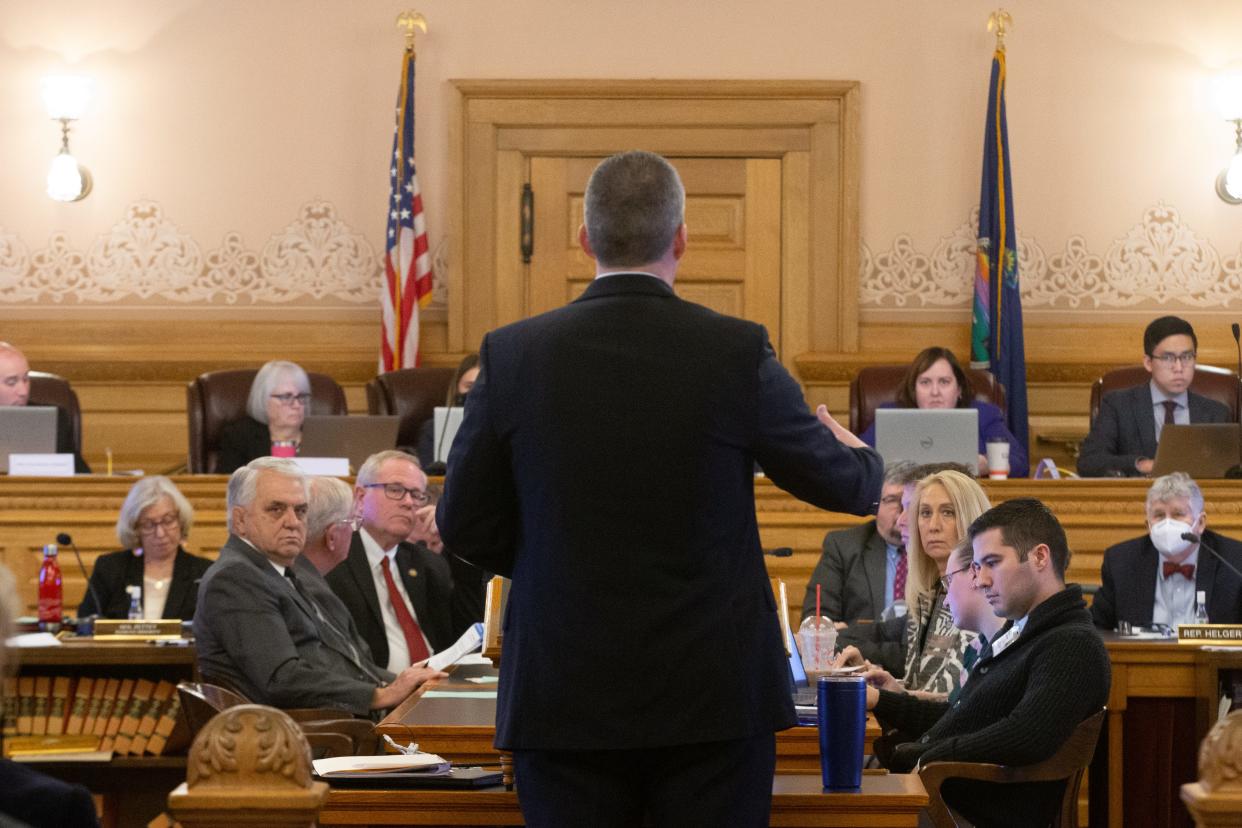
- Oops!Something went wrong.Please try again later.
The debate over how best to spend Kansas' $3.2 billion budget surplus began Thursday, with Gov. Laura Kelly rolling out a budget proposal that proposes a major increase to special education funding, more money for higher education and a pay increase for state workers.
While many of Kelly's spending priorities, such as a broad suite of tax cuts, were already well known, many of the items were not.
More:These tax cuts will be prioritized this legislative session as Kansas enjoys $2.3B surplus
Every lawmaker is expected to have ideas about how to spend the eye-popping pile of cash but Republicans are cautioning that they believe a recession is likely in the near future, leading to calls to save the bulk of the funds for the future.
Kelly's budget calls for investing more in infrastructure, putting an additional $500 million in the state's piggy bank for the future and bumps state employee pay.
Education takes center stage in budget proposal
While Kelly has long proclaimed herself to be the education governor, lawmakers have long been under fire from special education advocates and school districts for falling short of statutory requirements for funding.
The state government must cover 92% of costs for special education students above and beyond what is spent on an average pupil.
More:Is Kansas Legislature underfunding special education? Advocates say the state is falling far short
Many Republicans have disputed that the state is lagging, and more funding did not move in 2022, despite a last-ditch appeal from public schools. Districts argue they have been forced to shift funds from their general budgets to support special education students, a move that is hurting their bottom lines.
Kelly's budget will propose an additional $72.4 million per year for the next five years, eventually reaching an additional $362 million for Fiscal Year 2028, the year her administration claims the state would reach the 92% mark.
But Rep. Kristey Williams, R-Augusta, chair of the House K-12 Education Budget Committee, almost immediately poured cold water on Kelly's proposal, saying instead that she wants to focus on revising the state's school finance laws to account for what she views as inconsistencies on special education funding.
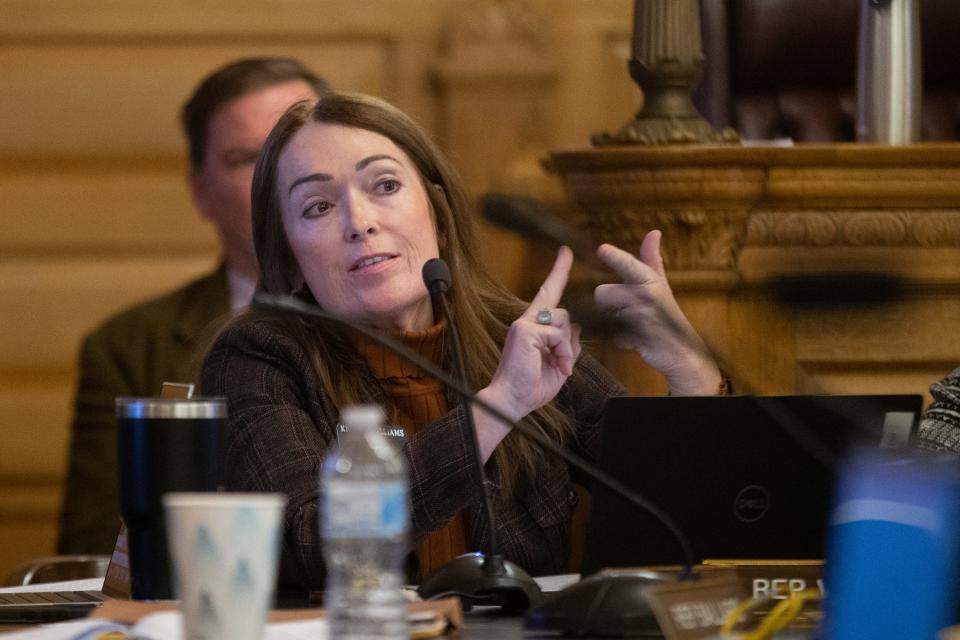
She argued, for instance, that special education costs are already baked in to the money districts receive.
"My whole objection to the budget is we're creating a solution without knowing the problem," she told reporters "Money is not always the answer to every problem. And so, I want us to make sure we do it the right way."
Williams instead touted a renewed effort to create educational savings account, a school choice option increasingly popular in conservative states that allows parents to spend the per-pupil funds usually given to a public school on other education-related items, including private school tuition.
While such a measure has been proposed in Kansas previously, Williams said it was not necessarily a given that it would be linked to the K-12 education budget, as it has been in years past.
Higher education also garnered significant attention for a second year in a row. Adam Proffitt, Kelly's budget director, told lawmakers the hope was more money could help keep tuition at the state's public colleges and universities stable, though there is no requirement that the schools do so.
More:Kansas higher education sits at a crossroads as officials ask, 'What will lawmakers do?'
Kansas' four-year universities will see the bulk of the additional money, with Kelly matching some — but not all — of the funding asks from the Kansas Board of Regents.
That includes $20 million in increased financial aid, $21 million to help offset inflation pressures and a $20 million fund to tackle a backlog of delayed maintenance projects that must be matched by the individual universities.
An additional pot of money to retain faculty was left out of the budget, however, as were many other aspects of the Regents' $253 million request, over twice the $108 million increase contained in the budget.
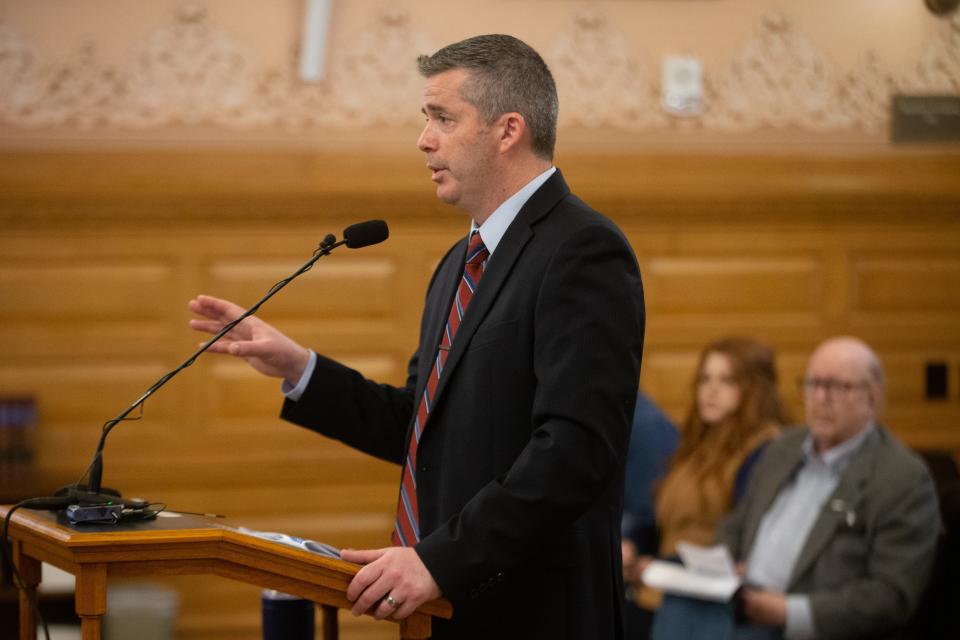
"Higher education is a workforce development tool," Proffitt said. "There has been a lot of activity across all corners of the state, with new businesses or expanding existing businesses and we want to make sure that we are training brilliant people to work for all these new businesses that are coming to Kansas."
Republicans have expressed skepticism of more money flowing to higher education, however, and are likely to scrutinize the ask. Independent, nonprofit colleges have also expressed frustration that expanded financial aid dollars will only flow to public universities.
But speaking to reporters, Rep. Troy Waymaster, R-Bunker Hill, chair of the House Appropriations Committee, said he was open to the increased funding.
"We also need to start looking at higher ed funding," Waymaster said. "Maybe not exactly the proposals that she has instituted in her budget today, but we'll have those discussions."
Balance between tax cuts, saving money likely to cause debate
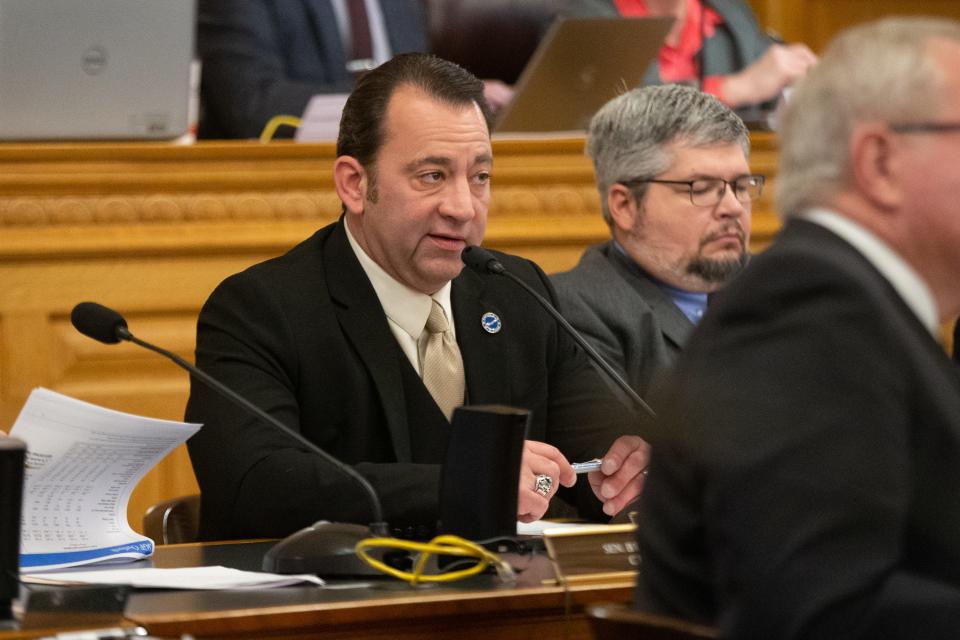
Taking the podium, J.G. Scott, director of the Kansas Legislative Research Department, quipped that he would describe the state's rosy budget profile — at least until Kelly's budget director took the stage to describe how to spend the bulk of the money.
"Study this pretty close because it's going to be good for 10 minutes," Scott said to laughter.
Kelly's budget will trim the projected surplus down to $1.98 billion.
But it also bakes in some of Kelly's signature items, some of which will be non-starters with the Republican-controlled legislators. That includes a renewed call to expand Medicaid and a push to speed up the elimination of the state sales tax on food, which is currently set to phase out in 2025.
Other tax cuts, however, will likely pique the interest of lawmakers from both parties, including a state sales tax holiday for school supplies, electronics and other items during the first weekend of August around the back-to-school season.
There also is bipartisan interest in a move to expand the number of Kansans exempt from paying taxes on their Social Security checks.
"There are other ways of creating economic benefits," said Rep. Henry Helgerson, D-Wichita. "Like giving the money back to individuals and letting them spend the money rather than us spending it."
But while Republicans will be interested in tackling tax cuts, many have urged caution due to the uncertain budget future.
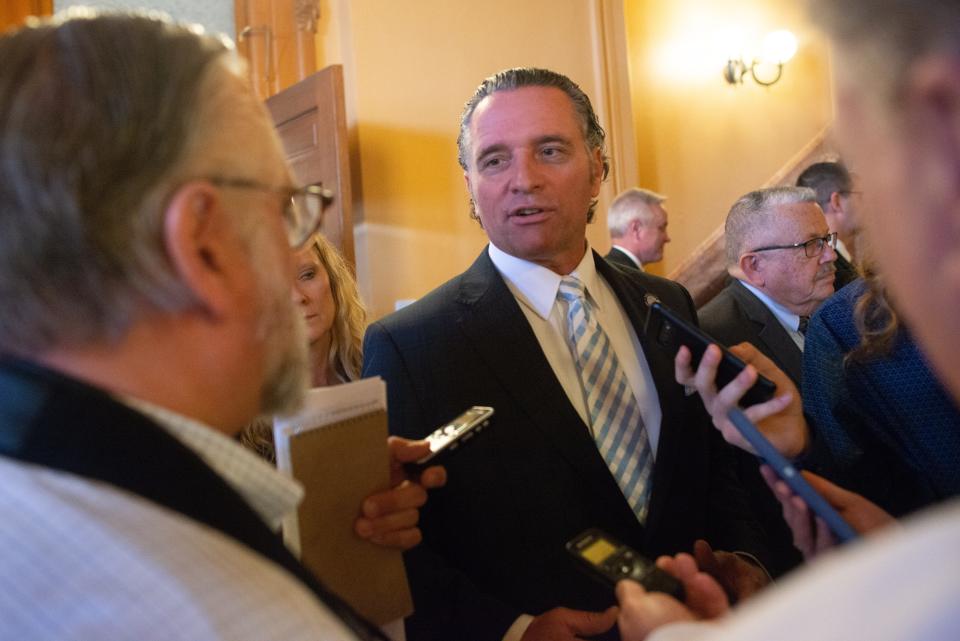
"I find it interesting, we actually might be in inverse positions, because she's going to be out here in four years," Senate President Ty Masterson, R-Andover, told reporters this week. "And she might be more comfortable with a bigger tax package than I am. We know a recession is coming."
Proffitt said Kelly's budget attempts to take that into account by proposing an additional $500 million deposit in the state's rainy-day fund, as well as dollars to pay down debt in a bit to shave off future interest payments.
But Masterson and others have pushed to make a much larger contribution to the rainy-day fund, potentially as much as $1 billion. Proffitt argued that was unnecessary.
"To have anything more in there might indicate there's an imbalance between revenues and expenditures," he told reporters. "We just want to make sure that we're managing taxpayer dollars effectively."
It also includes $220 million for infrastructure projects, an expenditure intended to maximize federal dollars set aside as part of the infrastructure package passed by Congress last year. The fund could be used to match federal funding for local or statewide projects.
And the document pushes to repay debt and pay cash for the state's $16 million share of a new federal veterans' home in Topeka in a bid to avoid millions in debt payments.
Budget calls for state employee pay hike
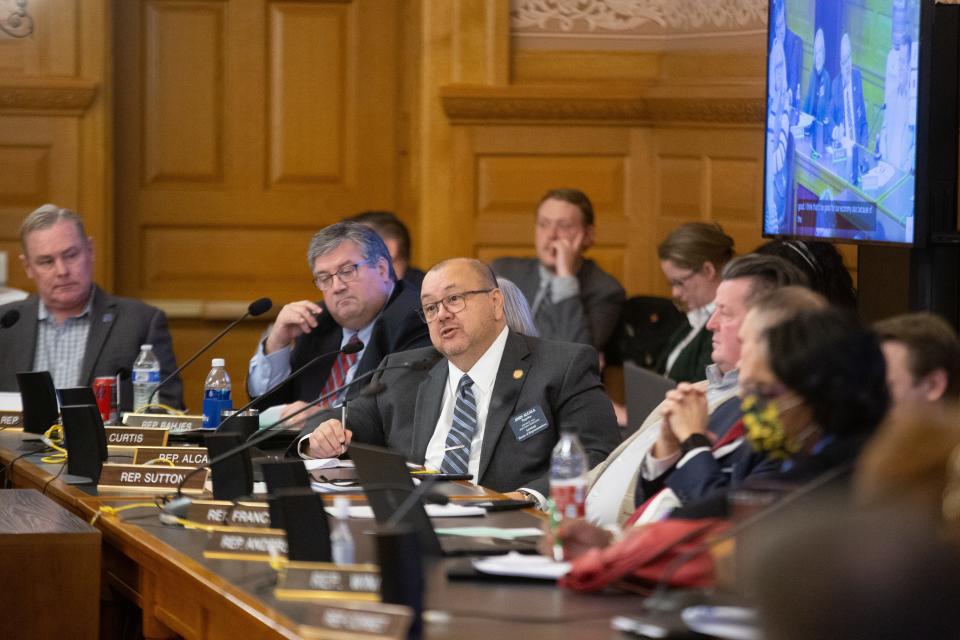
Kelly's budget again calls for a 5% pay raise for state employees, though the judicial branch and elected officials are exempted from the increase. It would mark the second state session in which state workers got a raise.
"I've always thought that state employees were underpaid," said Rep. John Alcala, D-Topeka. "I always thought we had an aging state employee group and couldn't go pick up and compete for kids coming right out of college."
Waymaster, however, was more skeptical.
"We need to start looking at not doing across the board pay increases, but actually having it based off of the individual's performance whether or not that pay increases," he said. "Generally, even if you were an exceptional employee, you may have only gotten a 2 or 2 1/2 percent pay increase, not 5."
The plan would also boost funding for some job classifications to within 5% of market rate, accounting for 5,000 workers in a range of fields, Proffitt said.
The Kelly administration is also seeking a policy change that would remove existing barriers to state agencies being able to offer potential workers a sign-on bonus, something available in other states.
This article originally appeared on Topeka Capital-Journal: Gov. Laura Kelly, Kansas Republicans to face off over state budget

